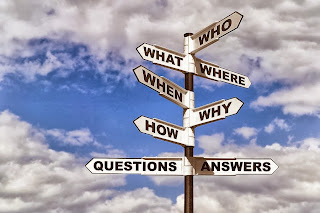What Do We Need to Know About Asking Questions to be an Effective Teacher?
Asking questions in the classroom plays a vital role in creating a learning process that is successful for our students. Why do teachers ask questions? Teachers ask questions to tell who is paying attention, and who has knowledge of understanding the particular lesson. Most importantly, teachers ask questions because learning extends outside the classroom. When a teacher ask questions in his/her classroom the teacher is modeling what students should be doing themselves. For example, asking questions in the classroom encourages students to ask questions outside the classroom. While it is important to ask questions in the classroom for many reasons, it is also vital to ask questions in the right way. Unfortunately, many times teachers tend to use this method incorrectly. I found some strategies that could be very beneficial resources to use in my own classroom at Asking Questions to Improve learning.
When asking questions it is important to keep in mind the course goals or objectives that you would like your students to accomplish in your own classroom. Whether these objectives are to understand the concepts of long division, or develop critical thinking skills. Avoid asking "leading questions". This regards to questions that have one direct answer. The reason a teacher should refrain from using leading questions is because it discourages students to think on their own. The other students do not participate in the questioning process and shut down knowing they are "off the hook". Follow a Yes or No question with an additional question. For example, encourage the student to ask why the student answered the way that he/she did. Asking the student why after answering a yes or no question also allows other students to be a part of the questioning process. Aim for direct, clear, specific questions. Instead of asking questions that are multilayered, ask questions that you can build on and that will create complexity. Use class time to help show students how to walk themselves through the multilayer questioning process. In class discussions, do not ask more than one question at once. This is because students will not actively participate because the students are unsure what question you want the students to answer. You will find in your own classroom that this tip is one that is hard to follow. When you are in the middle of a class discussion and everyone is participating at once it is very easily to jump ahead of yourselve and begin to ask all th questions that come to mind.
Include notes on your lesson plans of when you will pause to ask students questions. Actively planning questions outside of the classroom and knowing when you will provide a given time for questions will help create the questioning process to be successful. Do not be closed minded to only using one type of questioning method. For example, you should ask all types of question methods but remember when each question would be appropriate with what is being learned. For example, closed questions should be used to test student’s retention and comprehension of important information that they will need to remember. Closed questions are questions that can only have a certain number of answers. Managerial questions are used to make sure that each student understands the assignment and has the necessary utensils to complete the assignment. Open questions are used to encourage class participation with multiple answers and active learning. As Dr. Strange says himself, “questions are more important than answers!”


Thorough. Interesting. Well written. Or shall I say it appears you proofread your work this week?
ReplyDelete